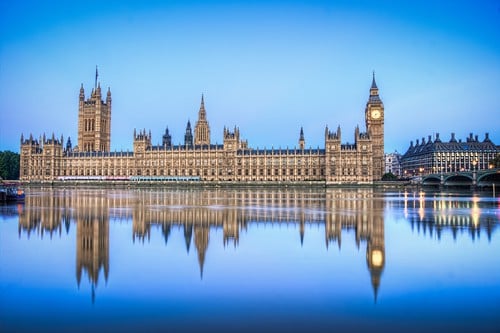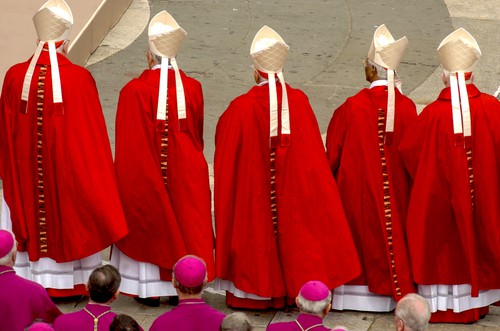The UK is preparing for a general election in May, and apathy is on the rise. The three main parties — Conservatives, Labour, and Liberal Democrats — are failing to inspire voters, especially the younger ones. They all seem to be pretty much the same. There’s a feeling that nothing will change whoever forms the new Government. The mood among voters, in other words, is sadly… “whatever.”
Of course there’s a sense of déjà vu as debates rage about the causes of voter disillusionment with traditional Westminster politics. But the problem is getting worse, especially among younger voters. At the last election (in 2010), 44% of 18 to 24 year-olds, and 55% of 25 to 34 year-olds, turned out to vote, compared to 61% turnout overall. Politicos here in the UK predict that turnout will be even lower in the upcoming election. Confidence in UK politicians has been knocked by a number of things. One is a belief that Parliament is simply incapable of bringing banks and companies to heel by (for example) making them pay their fair share of tax, or downsizing their executives outsized bonuses. People suspect that politicians’ personal interests are too intertwined with those of business interests to enforce this. Then there is the endless litany of MP expenses and abuse of position scandals. The result? Opinion polls indicate that the majority of voters think that it makes no difference which party is in power. In a nutshell, “whatever”.
Of course, there have been beneficiaries of this disenchantment. We’ve seen the rise of so-called third parties, who seek freedom from the traditional way of doing politics. These range from the UK Independence Party (freedom from the European Union, restricted immigration) the Greens (freedom from the prevailing economic models), and the Scottish Nationalists (freedom from Westminster altogether!). Each in their own way, these political newcomers portray themselves as anti-system, aligned more with ordinary people than with corrupt political elites.

Political Commentator Russell Brand Consulting with Fellow Policy Wonks
Phil Stafford // Shutterstock
But alas, another major beneficiary of this discontent surrounding the present state of UK politics is (what might be described as) the “why bother vote?” party. This “anti-party” has been bolstered by the young comedian Russell Brand, who in addition to big hair and a huge popular following, has become the figurehead for a movement that believes voting is pointless. Brand says that voting legitimizes the “facade” of democracy. To be fair, Brand does propose an alternative, and thinks that there are different ways to participate in democracy, like protesting. Although how seriously he pursues these alternatives remains to be seen. His views have struck a chord with many, and his anti-voting stance captured in an interview has attracted over 10m hits on YouTube.
Last month, the Church of England’s House of Bishops entered the fray, issuing a 52-page report on the subject of how Christians should approach the election. I must confess that I was initially suspicious. (Okay, cards on the table, I’m a former Anglican with bags of affection for a church I regard as a kind of midwife assisting at the birth of my faith. And I still have a huge soft spot for cathedral choral evensong where prayers for the Monarch are enshrined into the Book of Common Prayer responses. But truth be told, I was never a fan of the notion of bishops sitting in the House of Lords and exercising legislative power. Somehow the idea of an Established Church seemed to mix up the spiritual and temporal. If the Church is a sort of arm of the State, surely it has a restricted ability to speak out on issues affecting the nation. I much preferred Catholic rules prohibiting clerics sitting in Parliament.)
However, the bishops’ report is quite excellent. The bishops boldly and perceptively put their finger on key problems with existing British politics. So, perhaps it is an example of how an established church can use insider knowledge to prophetically critique flaws in the system.
The report produced quite a storm in the mainstream media, with many politicians criticizing it as too radical and partisan. Radical it is, but partisan it is not. Yes, it does single out certain issues — e.g., immigration, poverty, nuclear deterrence — but it does not present a shopping list of policies for the next government. In fact it is precisely this approach — a “retail politics” whereby parties tailor their policies to voting “consumers” — that the bishops identify as the problem.
The unsettling radicalism of the report lies in its devastating analysis of all the main political players: “The different parties have failed to offer attractive visions of the kind of society and culture they wish to see, or distinctive goals they might pursue. Instead, we are subjected to sterile arguments about who might manage the existing system best. There is no idealism in this prospectus” (§ 29, emphasis added).
Ouch. That’s like being head butted by a mitred old gentleman you once considered harmless. Previously you thought they only spoke outside the church when offering a few nice words to kick off the village fair, but now they are beating you with their crosier!
The bishops agree with Russell Brand on one thing, at least: politics needs to change. It should focus on the common good, on ways to involve more people in developing a broader political vision, and on supporting communities. But whereas Brand says we should switch off on Election Day, the bishops are telling its flock to switch on and get stuck in.
All this was fine for the good bishops until the bishops themselves got stuck in their own PR disaster. Less than a week after the bishops’ report, it was discovered that a number of people employed by the Church of England were being paid less than £7.85 ($11.85 USD) per hour, the minimum recommended by the bishops-backed “Living Wage” campaign. Smug cries of hypocrisy abounded, and the archbishop issued a mea culpa. Some said it showed the Anglican Church should keep its nose out of politics, leave politics to politicians, etc.
All of which leads me back to my opening remarks: the prevailing mood is that UK politics lacks vision and an authoritative voice right now — even the Church is liable to corruption. In turn, voters are gripped with cynicism and fear of hypocrisy.
* * *
But here, I think, is the tough truth of speaking publicly: If we are to have moral vision, a desire to change things, and to speak out, we are vulnerable to the charge of hypocrisy. And of course the charges are often going to be true. In fact the higher and more profound our ideals, the greater we are setting ourselves up for a gigantic fall into depths of hypocrisy. But does that mean we should water down our beliefs and aspirations, making them mediocre so we never risk being exposed as a hypocrite? Well, I don’t think followers of Christ could ever buy into that.
Writing in the Guardian newspaper, Giles Fraser dryly observes that “hypocrisy is an accusation often levelled at two groups in particular: lefties and the religious”. They both have a common vision of redesigning the world, a vision which they can never fully live up to. To these I would add a third: “greenies”. How many times have you heard of people holding strong environmental convictions, only to be ridiculed for taking a plane to this conference here, or buying a non-organic meal from there? As Fraser puts it, “[being charged with] hypocrisy is a near inevitable consequence of taking any sort of moral stand”. In other words, because we are humans, we are bound to fail even by our own measuring stick; but that does not mean we should not try.
* * *
To be clear, I am not trying to justify hypocrisy or double standards of any kind here. But I do think there’s a problem with the way modern media’s often vindictive hunt for hypocrisy creates not only a brand of risk-averse politics that lacks conviction, but also the resultant “don’t vote, because all politicians are the same” view among the voting public. A bit more forgiveness would not be remiss, and maybe this is an area where Christians (we of the “I have come not to call the righteous but sinners” variety) have a special contribution to make to the debate.
But most importantly, let’s take care to distinguish between two types of failure. First, there are the many deliberate failures resulting from lies, deceit, corruption and unrepentant hypocrisy (from the Greek hypokrisis, meaning ‘acting out a theatrical part,’ which implies a willful, public deception). These are plain wrong and rightly need to be named and shamed by the media. But then there is a second type of failure which is often not distinguished from the first type. Let’s call this second category “Failure”. This Failure consists of the inevitable failure to achieve an ideal, despite our best attempts and intentions. What we often label hypocrisy is not really hypocrisy, in the sense of a willful, public deception. Often enough, what we label hypocrisy is the willingness of a leader – political or religious – to wade into the uncertain waters of something aspirational, new, and morally demanding. Here again, Fraser offers us a different way of viewing politicians: “when they fail, let’s pick them up for the failing itself, and not because there is a gap between aspiration and reality.”
As with a life of faith, we have a few options with politics. One is to disengage and raise a cynical eyebrow to those who hope in politics and stop voting. Alternatively we can be paralysed by fear of hypocrisy, and convince ourselves that something better must come along eventually; until then, we won’t sully our hands with the likes of these politicians. Or we can acknowledge that our Christian values amount to more than mere rhetorical window dressing, and that they require us to get involved in the world as it is, messy and imperfect. And this requires that we open ourselves up to risks of failures, Failure, and — despite our best efforts — occasional charges of hypocrisy which may even purify our intentions.
* * *
So perhaps I should rephrase my opening statement. I’d rather be an idealist who is bound to fail than a non-voting ‘realist’ who can smugly claim “I told you so” without committing to any path himself. As Christians, we are experts in failing to live up to an ideal. It’s at the heart of who we are and what we believe. But the point is to keep on trying, and not to let failures/Failure have the last word.



